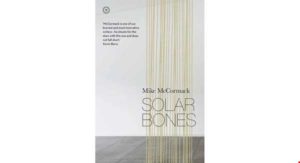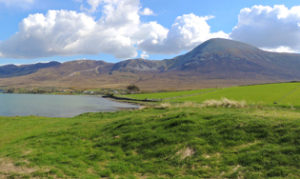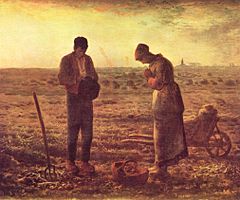Solar Bones by Mike McCormack

It is an experimental novel and it isn’t exactly a realist novel but there is such an inevitability to the prose, structure and story that it defies labels such as these.
Just as if I had turned on my music, ‘Solar Bones’ by Mike McCormack jolted me straight into its world and held me there through all its virtuoso meanderings right until the end. It is extraordinary and beautiful and has a powerful narrative thrust. It is, I think, only the second book that I’ve read this year that has dazzled me and kept me engaged throughout.

Croagh Patrick
Set in Mayo in the post-boom Irish recession of recent years, it is the story of Marcus Conway, an engineer, husband, father, son, not written as a caricature of a man, but as a decent chap with faults and problems who is doing his best to cope. Marcus tells us, in language of enormous beauty, of the minutiae of his world – oh minutiae, you little beauties – always such fascinating stuff.

The Angelus – Jean-François Millet
At the start, the Angelus bells are sounding, ‘ringing out over its villages and townlands, over the fields and hills and bogs in between, six chimes of three across a minute and a half, a summons struck on the lip of the void’. It is All Souls’ Day, when the dead return, and Marcus finds himself sitting at the table alone in his kitchen enveloped in ‘a crying sense of loneliness for my family’ for reasons which may or may not be obvious to the reader depending on how carefully she has read the back cover of the book, more on that later. Over the course of the novel, we accompany Marcus to the council offices where he works as a civil engineer, dealing with a local politician and a developer on the reconstruction of a bridge and the ensuing traffic chaos. We are shown the intimacy of his love for his wife who is recovering from the virus that has infected huge numbers of people in the locality because human waste has infiltrated the water supply. We witness his frustration with and his devotion to his two grow-up children via the Skype sessions with his clever son who tends to give up on things and who is working his way around Australia, and through the exhibitions of his daughter, an artist, who, in her first solo show, uses her own blood to write texts taken from court documents, an act which the protective father in Marcus finds deeply shocking.
We learn of the events of small town life ‘upholding the world like solar bones’, and in spite of Marcus’ frustration, there is never a sense of that the novel is debating the grotesqueness of life, instead we feel awe, a sense of awe that we should be alive at all. An ironically life-affirming twist, given what we may or may not know from the blurb.

I mentioned that I was jolted straight into the world of the novel, just as if I had turned on my music, but for several reasons, I was surprised at how easy it was to become engrossed. Firstly, in spite of the entire narrative being a recollection, it was never a dull read. Secondly, as I almost mentioned earlier, the ending is given in the blurb on the back of the book. Thirdly, the book is written in a 200 page single sentence, no chapters, no full stops and minimal punctuation. You can ignore the spoiler on the blurb, although it was deliberately flagged by the author to avoid giving the reader ‘a cheap reveal’ at the end, and you can read as if you didn’t know the ending but you will, I think, guess anyway. It struck me that the single sentence technique worked remarkably well. In this book, it is not a gimmick and it is not in the least distracting, if anything, it ensures that the prose flows with a sense of inevitability, and the novel is really easy to read. But is it a stream of consciousness novel? I hear you ask, – the author describes it as a stream of post-consciousness, and as I read I realised that that is an entirely appropriate description given what we know from the blurb. And the single sentence structure? This is a man seeing his life flash before his eyes. How could it have been written in any other way?
